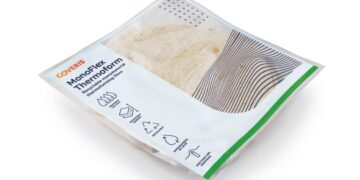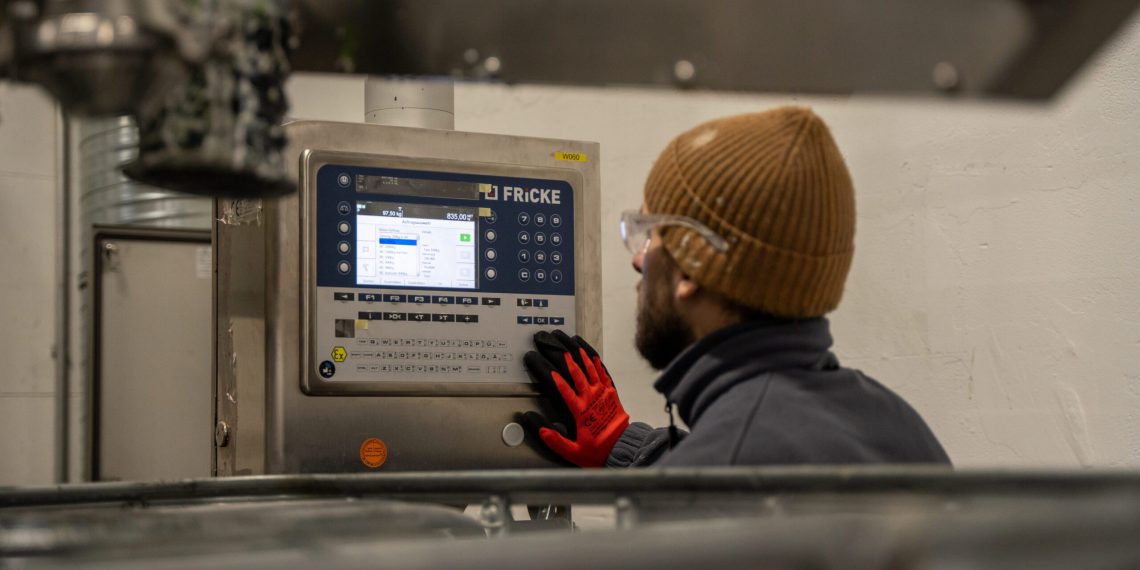One manufacturer of PMMA-based liquid plastic waterproofing and coating systems for building renovation is WestWood Kunststofftechnik GmbH. For parking garages, open-air decks, roads and bridges, but also for applications on roofs, arcades, balconies and other special applications such as heliports and waterproof concrete joints, the products must each have a number of application-specific properties, for example, to adhere to different substrates, be particularly weather-resistant and withstand high mechanical loads. The requirements for their production and processing are similar, as they also have a wide range of viscosities.
In order to expand its capacities and, in the process, to meet the increasing demands of its constantly evolving liquid resin systems, the Group has therefore commissioned a total of four new filling lines over the past two years from Fricke Abfülltechnik GmbH & Co. KG have been put into operation. These reliably fill a wide variety of products and enable fast changeover between different container types and sizes. The liquid plastics expert particularly benefits from the automated IBC filling of the new lines, which sustainably improves the workflow of the entire production.
“We have already been operating the oldest of our total of eight systems from Fricke for 20 years. As we enjoy working with competent partners from our region and have already had good experience with Fricke, it was therefore an obvious choice to commission the filling technology specialist again as part of our latest production expansion.”
- Harm Stelling, Sales Manager
The company develops and produces highly reactive liquid plastic systems for efficient building renovation. As diverse as the possible applications are, the PMMA resins have to meet a wide range of requirements. These range from visual specifications to a very short reaction time as well as permanent elasticity and resistance to mechanical stress from people, furniture, vehicles or even tree roots. They must also adhere reliably to a wide variety of substrates and resist aggressive chemicals such as chlorides and hydrolysis.
Having the right system ready for each of these purposes means frequent product changes on the individual lines in the manufacturing process. This in turn means that the equipment has to be cleaned each time, resulting in repeated downtime. In addition, resins are filled into a wide range of different containers according to demand, so the old machines required frequent, time-consuming changes to configurations or direct manual control of filling operations. “For WestWood, it is essential that the systems can be cleaned very quickly for product changes and flexibly cope with different viscosities as well as container sizes,” knows Dirk Novak, Filling Technology Sales. “For this reason, the new filling systems each have only three components that come into contact with the product and can be adjusted to the respective products and filling quantities within a very short time by reverting to filling programs stored in advance.”
Improved production processes at ergonomically designed stations.
The latest acquisitions as part of the production expansion include two FFS 31 lines and an EFS 11, which were already commissioned in 2020, and another EFS 11 machine last year. The two compact EFS 11 lines are used for filling different materials into open containers such as cans, pails and hobbocks weighing between 1 and 60 kg. They are characterized by their space-saving dimensions of only about 1,000 x 800 mm, which correspond to those of a Euro pallet. “Thanks to a downstream roller conveyor and pack centering, the container to be filled can be positioned particularly easily under the filling valve and transported on quickly after the semi-automatic filling process,” explains Novak. “To make the process even more efficient, an automatic lid closer was installed immediately downstream at WestWood.”
The FFS 31, on the other hand, is an under-bunghole filling station with an overhead valve that fills containers from 200 to 1,500 kg directly on the pallet. The machine operator only needs one hand for operation and always has an eye on the filling process, which is also semi-automatic, thanks to the operating handle attached to a freely swiveling telescopic extension. Both features minimize the risk of accidents and errors when filling larger containers. Production processes benefit particularly from automated IBC filling, as Stelling confirms: “Filling into large IBCs no longer has to be stopped manually, as was previously the case. This massively increases the efficiency of the production lines.” Furthermore, due to handling directly on the pallet, it is also no longer necessary to lift the filled containers by hand — regardless of whether they are drums or large IBCs. “Thanks to the new equipment, heavy physical labor is no longer required and our employees’ health is protected in the long term,” adds Stelling.
Fast changeover to varying sizes and products
All four of the newly implemented lines are EX-protected and also have in common that they can be converted to different media and container dimensions within a very short time in line with the daily requirements of the production process. “To this end, we have reduced to a minimum the number of components that need to be cleaned to prevent cross-contamination with each product changeover in both systems,” explains Novak.
“For example, the valves each consist of only three parts that come into contact with the product, which can be disassembled, cleaned and reassembled very easily by one person.” The integrated software also allows different filling programs for the various products and container sizes to be stored directly on the systems and then activated without further ado by entering the corresponding program number on the control panel.
During the 20 years of cooperation, WestWood has been able to convince itself of the efficient and reliable operation of the systems from the North Rhine-Westphalian filling technology specialist. “Since we had also previously used Fricke machines in all three production lines, our employees are already familiar with how they work, so hardly any training time was necessary,” sums up Stelling. “Whether it’s a matter of precision, the cleaning and maintenance effort or the adaptation to different viscosities — the systems from Fricke have never let us down.”

















